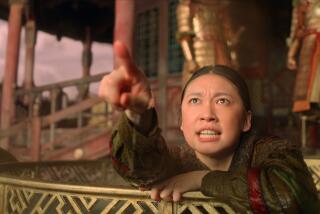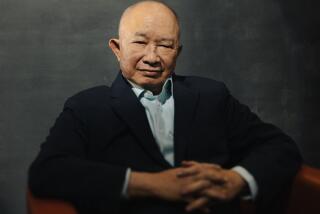With two kung fu films, HBO cautiously tests the waters in China
- Share via
Reporting from Hengdian, China — For American film and TV show creators and distributors, it hasn’t exactly been smooth sailing in China recently.
Online video portals have been ordered to limit foreign films and TV shows to 30% of their offerings, driving down licensing fees. Authorities are discouraging broadcasters from using imported TV formats to make programs such as “The Voice of China.” This spring, the government closed down Walt Disney Co.’s movie streaming service, and Apple’s as well.
That hasn’t discouraged HBO from testing the waters. On a steamy August morning, HBO Asia Chief Executive Jonathan Spink was tromping around Hengdian World Studios, China’s largest film and TV production base, passing popsicles around an outdoor set where filming was wrapping up on the premium channel’s first two original productions in China.
In the grove of bamboo, a dummy corpse dripping with fake blood perched on a fence as cicadas buzzed in the trees. Another mannequin, hog-tied and strung up by a rope, dangled from a tree over a bed of large spikes. But this was no Chinese version of “Game of Thrones.” HBO Asia is moving cautiously out of the gate, with two made-for-TV kung fu movies, “Master of the Drunken Fist: Beggar So” and “Master of the Shadowless Kick: Wong Kei-ying.”
The Mandarin-language films are being co-produced with China Movie Channel, a division of state broadcaster China Central Television, or CCTV. China Movie Channel, also known as CCTV6, will handle distribution on the mainland, while HBO will air the films across Asia.
“We are experimenting. We are learning,” Spink said. Rather than have HBO be seen as just another American company angling for a way to pile into China, Spink said, “this is about taking great content out of China.”
Time Warner Inc.’s HBO Asia has a presence in 23 territories across Asia, including Malaysia, Taiwan, Hong Kong and Singapore. In many countries, HBO offers its own movie channels, as well as online streaming services and on-demand programming.
Time Warner, and other media companies, view foreign markets as increasingly important sources of revenue. HBO, in the last decade, has put a greater emphasis on its international profile and consolidated ownership interests in its branded channels. HBO has channels in Latin America, Europe and Asia, including India, enabling it to parlay its strong hand in original programming. The company also is determined to keep pace with its archrival streaming service, Netflix, which has been aggressively expanding oversees with local language productions.
Until recently, HBO programming in China had been restricted to high-end hotels. To reach a broader Chinese audience, HBO in 2014 signed a content licensing deal with Internet giant Tencent; the online portal now offers viewers programs including “Game of Thrones,” “Sex and the City” and “True Detective.” Last year, HBO Asia partnered with China’s national cable network and an Internet protocol TV operator to provide HBO originals and Hollywood movies as part of their subscription offerings to general households.
HBO Asia began co-producing original English-language productions four years ago, starting with an action-adventure film, “Dead Mine,” and a Singapore-set 1960s noir detective series, “Serangoon Road.” Those were followed by the horror mini-series “Grace” and “Halfworlds,” a supernatural thriller series filmed in Indonesia.
This year, HBO Asia has moved into Chinese-language content, launching not just “Master of the Drunken Fist” and “Master of the Shadowless Kick” on the mainland but also starting production in Taiwan this summer on “The Psychic,” a TV series.
“Master of the Drunken Fist” and “Master of the Shadowless Kick” are directed by Guo Jian-yong, a veteran action choreographer on films including John Woo’s “Red Cliff” and “The Transporter” series that starred Jason Statham. The “masters” in both movies are real historical figures familiar to Chinese audiences and kung fu enthusiasts.
If the first two films are well-received, HBO and CMC could add further installments to essentially make a series, said Beibei Fan, senior vice president of new business at HBO Asia. “These are almost like pilots,” said Fan, though each film stands on its own.
CMC and HBO Asia refused to discuss how much they were spending on the two films, but Fan said the budgets were “slightly higher” than HBO Asia’s earlier original productions. Although there are no plans now to run the movies on HBO’s U.S. platforms, Fan said there’s already enough of a Chinese audience in Asia to make the project worthwhile.
China Movie Channel broadcasts the Oscars in China and has licensing deals with all the major Hollywood studios. The channel has been stepping up its collaborations with Hollywood. It invested in Paramount’s “Transformers: Age of Extinction” in 2014 and “Mission: Impossible — Rogue Nation” last year.
CMC in the past has licensed and aired HBO original TV movies, including “The Gathering Storm,” but this is the first time it’s co-producing with HBO Asia.
Noting that CMC reaches more than 1 billion viewers in China while HBO Asia has a wide presence across Asia, CMC Vice President Zhang Ling called the partnership a “powerful combination.”
Partnering with a state-run entity such as CMC on relatively tame fare, and becoming an overseas distribution partner for Chinese-made content, could help put HBO in the good graces of Chinese authorities. “President Xi Jinping wants to take Chinese culture to the world,” said Guo, the director. “I’m honored to be able to direct these two movies and be a part of it.”
Guo said he’s striving to make as much of the action as real as possible, with the actors performing almost all their own stunts. “Audiences across all cultures can appreciate that,” he said.
Although the films are being co-produced by HBO, Guo said the content would not be an awkward East-West mashup. Four of the five writers across the two films are Chinese; one is Singaporean.
“We have the endorsement of the HBO brand, but it has to be authentic Chinese if it’s going to work,” Guo said. “It can’t be half-Western and half-Chinese or audiences will be confused.”
“Master of the Shadowless Kick” tells the story of Wong Kei-ying, a martial arts master and physician who lived in the 1800s during a time when China was being invaded by European powers and ravaged by opium addiction. Trying to save his master, Wong takes on the treacherous governor of Canton province, who has a hand in the drug business.
“The role is quite sophisticated,” said Sun Hao-ran, who plays Wong. “He’s kind of a national hero who battles opium and he’s also a father.”
“Master of The Drunken Fist: Beggar So” centers on So Chan, one of the kung fu masters among the legendary “Ten Tigers of Canton.” So has been the subject of numerous martial arts films including the 1992 Steven Chow movie “King of Beggars.”
HBO’s collaboration with CMC may also help it lift its profile in mainland China, where broadcasting is heavily regulated and controlled by the state. Even Cao Jun, the star of “Master of the Drunken Fist,” admitted he had only a vague familiarity with HBO.
“HBO is an American brand, right?” he said on the sidelines of the set in Hengdian. “We can’t receive this channel in mainland China. So I don’t know much about it; I have heard the name, I know it’s a good channel. It’s a pity we cannot watch it; I don’t know if we can watch it online. These two films will be screened on HBO, right?”
Nicole Liu and Yingzhi Yang in The Times’ Beijing bureau contributed to this report. Staff writer Meg James in Los Angeles also contributed.
See the most-read stories in Entertainment this hour »
More to Read
From the Oscars to the Emmys.
Get the Envelope newsletter for exclusive awards season coverage, behind-the-scenes stories from the Envelope podcast and columnist Glenn Whipp’s must-read analysis.
You may occasionally receive promotional content from the Los Angeles Times.











